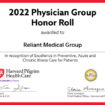
Reliant Medical Group Made the Honor...
Once again, our Reliant Medical Group caregivers have been recognized for their commitment to providing high-quality care by being named...
Dizziness is the second most common complaint heard by physicians. Each year, nearly 8 million patients visit their doctor for the evaluation and treatment of dizziness symptoms. According to the National Institute of Health, most causes of dizziness can be found after a thorough evaluation. Once diagnosed, Vestibular Rehabilitation may offer relief of symptoms and help improve quality of life for patients.
Other symptoms may include problems with vision, poor memory or concentration, headaches, muscle aches in the back and neck, increased sensitivity to noise and lighting changes, fatigue, anxiety/depression, and loss of stamina.
Although many things can cause dizziness (also known as vertigo) 85% of causes originate in the inner ear. Your brain constantly coordinates information from your inner ears, eyes, and balance sensors located in your feet, trunk and neck to tell your body where you are in space (also known as proprioception).
Vestibular Rehabilitation looks at all three systems and how they interact and integrate with each other. Specific exercises will be given to strengthen or correct impaired areas, or teach the other systems to compensate for the damaged portion. Treatment may include:
A comprehensive evaluation will be performed by a licensed physical therapist who specializes in Vestibular Rehabilitation. Evaluation includes testing of all areas involved in vestibular health including inner ear, eye function, proprioception and ways in which these areas interact with one another. Other areas may include cervical assessment, balance assessment, and lower extremity strength and flexibility. The physical therapist will identify problem areas and establish an individualized treatment plan if a Vestibular Rehabilitation approach is appropriate.
Most referrals come from ENT physicians or neurologists who have confirmed a diagnosis of Vestibular Pathology. Referrals are also accepted from primary care doctors. Interested patients or referral sources are encouraged to call Reliant Medical Group Rehabilitative Services at (508) 856-9510 for more information.